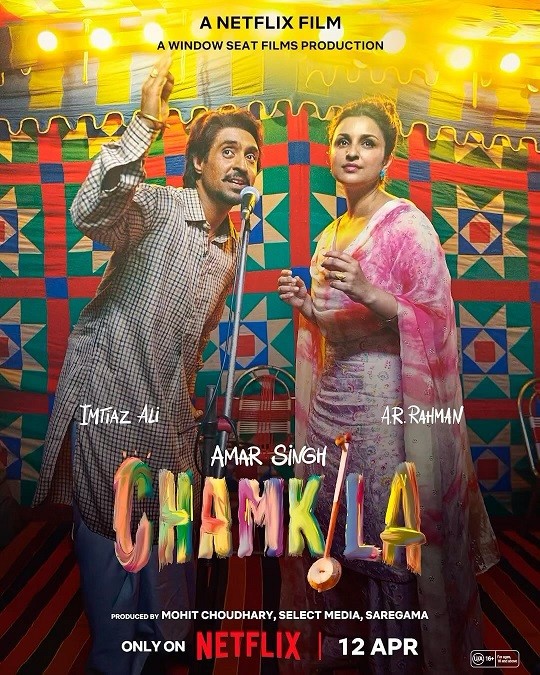Amar Singh Chamkila
Introduction
While watching the first season of Chamak on SonyLiv, I did not realise that its premise was taken from the life of Amar Singh Chamkila. And Amar Singh Chamkila the film has got to be one of the most enchanting biopics to have ever been made, and a film that marks a rousing comeback of one of my favourite directors, Imtiaz Ali. Even as Chamkila premieres on Netflix later today(it would already have by the time this review is out), I was one of the few lucky ones to watch it on the big screen, and it was an experience that did push me in a zone of trance for so many reasons. I must admit that I was reading about the famous or infamous musician(depending on how you perceive him as an artist), and I realise the politics of the land and the era that played a very important part in his rise and eventual fall of fate. But to present him in a certain light with the incorporation of all songs along the way was going to be a massive challenge for the makers. Yet, we all know what the team of Imtiaz Ali, AR Rahman and Irshad Kamil are capable of given their last collaboration with Rockstar. And boy did they deliver a gem that I have been itching to write on, ever since the screening was done. So then how good is the film Amar Singh Chamkila, let’s find out.
Story & Screenplay
Amar Singh Chamkila follows the story of the famous(or infamous) artist from the state of Punjab who makes sudden waves with his revolutionary music and his double meaning lyrics that catches the fancy of the audience until he is shot dead(along with his wife) at an ‘Akhada’ before his performance. The case remains unsolved till date but the story here focuses on the rise and fall of the artist while exploring the various theories around his death, as told by friends and family close to him. And the story here is phenomenal given that it unfolds in two verses – one on the surface level that acquaints us with the life of Amar Singh Chamkila and second, the undercurrents of the story that unfold almost like a social commentary through the music in the drama that itself plays a vital character. Now biopics are always a tricky proposition and most films of this genre do end up being fragmented but this is where the genius of the screenplay kicks in with Chamkila. Standing at a runtime of 145 minutes, the structure and template of the screenplay did remind me of Rockstar. And while most may have criticized the template back in 2011 only to turn around and say that it was ahead of its time, the same folks would be more appreciative of this format that literally ironed out any form of fragments from the narrative while transforming it into one of those rare gems that need to be studied, cherished and savoured.
The drama opens with the introduction of the protagonist and his wife who arrive to perform at an ‘Akhada’ moments before they are gunned down. This technique of commanding attention from the viewers is similar to that phenomenal opening scene from Gangs Of Wasseypur, and here, the entire sequence plays off in a rather terrifying sequence which is disturbing in many ways. Soon after, the ambience of fear engulfing the surroundings is aided when all the characters break into a song which essentially represents their interpretation of the reason why Chamkila and his wife may have been gunned down. And this is where you get flashes about the early life of the protagonist along with his character traits that play a part in him penning some controversial songs that continue to be chartbusters till date. The narrative structure is such that almost all events unfold through a series of flashbacks as told through the gaze of people close to him. This, as the fear of them being gunned down remains palpable all throughout.
The proceedings are supremely engaging and interesting that unfolds almost in the form of a musical with lyrics popping up onscreen that helps in giving a jist of what the intended meaning(or double meaning) of the song is. And this pattern remains pretty consistent, as you are acquainted with how the protagonist got his first break to the coining of his name ‘Chamkila’, and to the struggles he faced while reaching to a certain height and maintaining his position there. You can make out the amount of research that has gone into creating this chaos wherein you still aren’t sure on who the assailants were behind the assassination of Amar Singh Chamkila. And the screenplay continues to remain non-committal, often taking into account the folks that the protagonist may have rubbed the wrong way, intentionally or otherwise. This, as the narrative style often oscillates between the past and the present wherein you get familiar with some important and controversial landmarks of the protagonist – from being married twice to a hint of a caste issue with the family of his second wife, and some established artists that find themselves out of work due to the prowess and demand of the protagonist.
The theme of the drama is never serious in totality. In fact, there are subtle bouts of humour that are interpersed in the screenplay, mostly tongue and cheek which is synonynous with the songs produced by the protagonist. And lust and sexuality as a theme is identified to be gender neutral as presented through one of the songs of the film. The underlying current of the politics of the land with respect to the 1980s in Punjab is effectively showcased to have had a direct impact on the life of the protagonist who was in his mid-twenties then. The levels of the danger surrounding the protagonist as he finds himself sandwiched between the politics of the authorities and the anti-establishment elements is an eye-opener especially when you remind yourself that he was just a harmless artist at the end of the day who served people what they loved the most. And his level of craze amongst his fans is beautifully represented in one scene when the organizer says that he had to put a 1000 more seats to accomodate the audience, about that many more than Mr Bachchan who had previously performed in the same auditorium(a scene created in our screening too when people turned up more than the capacity of the auditorium). And when fear takes a backseat is when tragedy strikes, and while the events of the opening sequence are replayed, it gets even more traumatic and disturbing given that at the end of the film, you are acquainted with the life of the protagonist that was unfamiliar territory at the start of the film. The screenplay is an absolute masterclass in terms of narrating a biopic, something that stays with you long after the film has ended!
Dialogues, Music & Direction
The dialogues are effective but sparingly used, almost like fillers in conversations wherein most of the heavy lifting is done through the songs and the music(although this isn’t entirely a musical). The music by AR Rahman and the lyrics by Irshad Kamil are such an important aspect to the success of the drama because the music here not only acts as a social commentary and a source for the narrative to shepherd ahead but it also plays a vital character in the overall scheme of things. Some recreations of Amar Singh Chamkila which were performed live and in sync sound have a lasting impact in the context of the film. The BGM is excellent and never misses a single beat in the narrative while almost creating an ambience of trance throughout.
The cinematography is an important piece of the puzzle that runs riot here by creating bouts of chaos throughout the narrative. The frames range from displaying words to almost dividing the screen into the past and present or immediately breaking into animation, the style of narration is effective in representing the chaos in the life of the protagonist even as the core represents a sense of calmness. This dichotomy is beautifully represented through the frames. The editing is excellent and this narrative template was not easy to implement, but the editor Aarti Bajaj does a phenomenal job here. Director Imtiaz Ali returns with a bang in a story that he pulls off with such sincerity and earnestness. His ability to create a world of trance while tactfully constructing a drama around his controversial protagonist was incredible to witness, and he never really shies away from adding social commentary through the songs that float in as an undercurrent. The direction was just brilliant and one of the finest that I may have witnessed so far!
Performances
The performances are incredibly good and once again a huge shoutout to Mukesh Chhabra for tactfully handpicking actor from the region of Punjab to create the right kind of ambience in the drama. Anjali Sharma and Kul Sidhu as Gurmail have their moments to shine despite a limited screen time. Angad Singh, Jashn Kohli, Vipin Katyal and Udaybir Sandhu are first rate. Nisha Bano, Robbie Johal as Kikkar, Tushar Dutt as Takkan and Pavneet Singh as Babbu are incredibly good. Anurag Arora who plays the cop might seem to be stern to begin with bit has such a beautiful character arc that he pulls off with subtlety. Apinderdeep Singh as Swarn oozes of sincerity and is really affable in his character. Right from his introduction, there is a subtly pleasant vibe around his character that fits in subtle bouts of humour in his introductory scene amidst a tense ambience. Yet, his disarming smile is something that really draws you to the character which was filled with warmth and friendship towards the protagonist. Anjum Batra is such a brilliant actor and this is another performance of his that absolutely hits the bullseye. As Tikke, there was a range of emotions that he had to dabble with including showcases subtle bouts of eccentricity and it was such an incredible performance, one of the highest order.
Parineeti Chopra as Amarjot delivers probably the best performance of her career so far. This act of hers required a lot of polishing in terms of singing in high notes that Amarjyot used to do back in the day. We all know Parineeti can sing but to actually sing live and match up to the intensity of Diljit was such a huge accomplishment. She was absolutely brilliant in a performance that she made her own!
Diljit Dosanjh as Amar Singh Chamkila delivers once again the best performance of his career. Right from getting his appearance right to his body language and mannerisms along with likable bouts of awkwardness and humour, he was such a delight to witness. And his singing absolutely adds a layer of trance to his already incredible performance that just left me in a state of daze, days after the screener. He was brilliant to the core!
Conclusion
Amar Singh Chamkila is a musical tragicomedy of an eternal artist packaged in a brilliant form of trance, in a drama that is possibly the best Hindi film of 2024(and it will be hard to beat this one). Available on Netflix and Highly Highly Recommended!




